What you need to know about becoming an NP.
This article outlines how to become a nurse practitioner in the U.S., including what NP's are, what NP's do, and what you need to complete in order to find employment as a nurse practitioner.
This article outlines how to become a nurse practitioner in the U.S., including what NP's are, what NP's do, and what you need to do to become one.
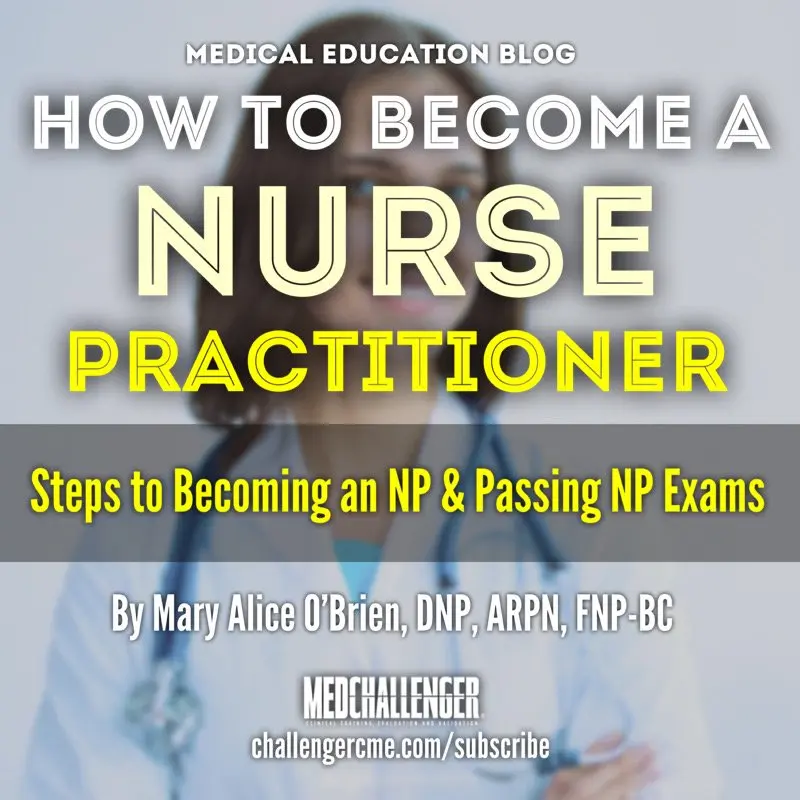
This article outlines how to become a nurse practitioner in the U.S., including what NP's are, what NP's do, and what you need to complete in order to find employment as a nurse practitioner.
Nurse practitioners (NPs) deliver primary, acute, and emergency care to patients. In a sense, you can think of a nurse practitioner as a nurse that practices medicine - that is, in certain circumstances, the NP can hold substantial authority and act as a lead healthcare provider offering of advanced medical services, diagnosing, and treating patients with different illnesses, often within a specialization, such as pediatrics or mental health.
These professionals evaluate patients to determine treatment options and educates others on methods for avoiding sickness.
Each state regulates the services that NPs can deliver and under what conditions. Some states may insist NPs work under licensed physicians or limit the types of medications NPs can prescribe. Responsibilities also vary by specialization.
Common tasks for NPs include conducting check-ups, refilling prescriptions, requesting lab tests, and deciding on treatments for issues like infections, viruses, and hypertension. When necessary, these practitioners can refer patients to specialists for expert care.
NPs should be detail-oriented problem solvers who can consider all aspects of a person's health to determine any relevant concerns. Candidates should communicate well and be able to put patients at ease.
Any organization that provides healthcare may hire NPs. These organizations include hospitals, doctor's offices, hospice services, and schools. In some states, NPs can also open their own practices.
Working environments often relate to the practitioner's specialization. For instance, a women's health nurse practitioner may work at a women's clinic, while a candidate who specializes in geriatrics may practice at a nursing home.
Specializations also affect work hours. As an example, women's clinics may operate weekdays during regular business hours. Emergency NPs, however, might be called into work at any time.
In 2018, The Bureau of Labor Statistics (BLS) listed a median income of over $100,000 for nurse practitioners. NPs are in high demand. The BLS projects career opportunities for NPs to grow by 28% from 2018-28. However, for candidates to join this lucrative profession, they must obtain the required academic and license credentials.
This section outlines how to become a nurse practitioner in the U.S., so candidates should consult their local boards for state-specific information.
Gain Admission to an Accredited MSN or DNP Program - Candidates for NP credentials must decide whether they want to pursue a Master of Science in Nursing (MSN) or a Doctor of Nursing Practice (DNP) degree. States may only require a master's, but a doctorate indicates more in-depth knowledge and can help individuals who are competing for NP jobs. A doctor of nursing practice (DNP), in particular, may qualify graduates for nursing leadership positions in areas of management and policy-building. The American Association of Colleges of Nursing pushed to make the doctorate a requirement for advanced practice nurses in 2004. Should this advancement occur, DNP graduates will already have the required education. Holding a doctorate can also increase salary expectations for NPs.
Earn a MSN or DNP Degree - States require advanced degrees for NPs. These programs often call for clinical work and incorporate specializations that prepare for specific careers. For instance, a student who intends to work in pediatrics should choose a program that addresses pediatric concerns and perform practicums or internships in pediatric-focused settings. Candidates should also participate in school events and local training opportunities that relate to their focus areas.
Obtain Certification from a Specialty Nursing Board - Candidates should earn a national NP certification, but should only consider options that reflect their specializations, such as emergency care, mental health, pediatrics, or gerontology. These certifications may come from organizations, such as the American Nurses Credentialing Center (ANCC), American Academy of Nurse Practitioners Certification Board (AANPCB), American Association of Critical-Care Nurses (AACN), Pediatric Nursing Certification Board (PNCB), American Association of Nurse Practitioners (AANP), and National Certification Corporation (NCC). Certifications typically require evidence of clinical work, having met academic requirements, an application fee, and a standardized examination.
Obtain Nurse Practitioner State Licensure - Nurse practitioner requirements often include proof of an advanced nursing degree and national nursing certification, which relate to specializations. Candidates should consider their career goals before choosing educational programs and certifications to make sure their credentials highlight necessary focuses. Additional requirements for NPs may include an application, proof of a collaborative agreement with a physician dependent on state of licensure, acknowledgment of board standards, and a fee. NP credentials may also require periodic renewal, which calls for continuing education hours or proof of recertification through a national certification organization.
Find Employment - Advanced degrees and national certifications typically call for clinical work. These experiences can help students earn employment by fostering professional connections. Candidates can also explore training opportunities to stand out as job competitors. Schools and professional organizations may provide career centers that help with finding and preparing for employment. Applying for an NP career may require a resume or CV with evidence of degrees, certifications, and licenses.
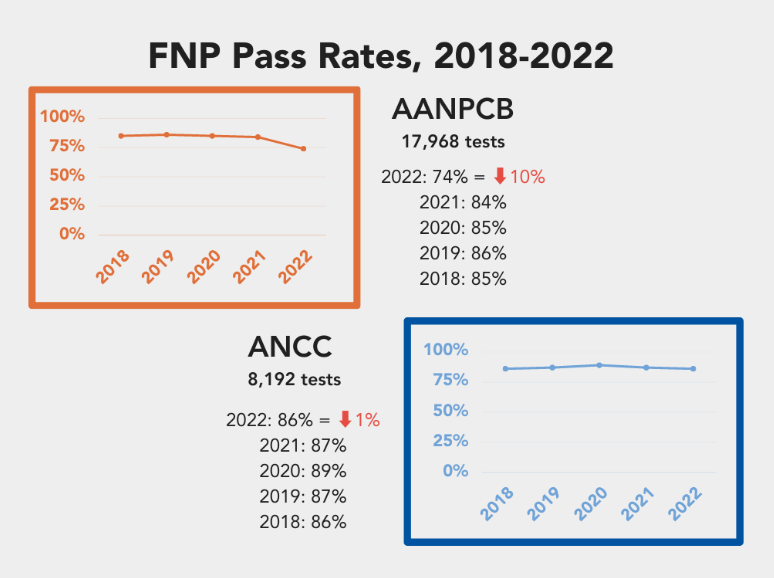
See article: A Little Dive Into AANP's 2022 FNP Online Education Statistics
Nurse practitioner requirements often include a master's degree, which can take 2-3 years to complete. Admission to a master's program typically requires a bachelor's degree, which adds around four years to educational timelines. Candidates who pursue DNPs may dedicate three or more additional years to their education, though state boards may not insist on this degree for certification or licensure.
NPs hold more advanced degrees and work more independently than RNs. Depending on the state in which one practices determines any restrictions of practice inclusive of a requirement for agreements with physicians, NPs conduct check-ups, diagnose patients, order tests, and prescribe medication. NPs may also, in some locations, open private practices and often earn more than RNs.
Nearly two dozen states grant NPs full practice rights. However, other states insist NPs work with licensed physicians, while other areas require supervision and limit the activities that NPs can perform. Candidates should consult their local boards to determine their available options.
Becoming an NP requires licenses and certifications, with state boards outlining the criteria for each credential. These regulations increase the quality of in-state healthcare by ensuring practitioners possess the knowledge and experience to diagnose and treat patients. NP credentials often include certification from a national organization and passing scores on standardized exams, which provide further evidence of candidates' abilities.
Requirements for NP credentials vary depending on location, so candidates should research local regulations to determine criteria. Usually, though, requirements include an RN license, advanced practice credentials, and a national certification. However, candidates can enhance their qualifications by earning additional certifications.
The National Council of State Boards of Nursing and individual state boards oversee nursing licensure in the United States. To become a nurse practitioner, candidates must earn an RN license. This credential often requires graduating from a program that the state's board approves, such as an associate or bachelor's in nursing. Program requirements may include courses on specific topics in diagnosis and health assessment and practicum experiences.
To receive a RN license, applicants must pass the NCLEX. The exam's structure varies but may include over 200 questions and a six-hour time limit. Candidates can register for the NCLEX after receiving authorization to test and paying a registration fee of $200. Other requirements for an RN license may include a criminal background check and application fee. Med-Challenger offers effective NCLEX prep.
NPs must also pursue advanced credentials, such as an advanced practice registered nurse (APRN) license. This credential calls for a graduate degree and national certification from agencies like the ANCC or AANP. These certifications can reflect the applicant's specialization and may call for clinical work fees and a certification exam. Med-Challenger offers effective AANP and ANCC board exam review as well as AAENP exam review. Often, APRN credentials are renewed along with RN licenses.
National certifications for APRN licenses can come from agencies like the ANCC, AANPCB, AACN, PNCB, and NCC. These credentials prepare for careers in certain specializations. Certifications include emergency care, family practice, pediatrics, and gerontology. Candidates should research requirements for their certifications, as each option may call for unique elements. Common requirements, though, include examinations, application fees, and fieldwork.
Individuals should consider multiple certifications before choosing an option. For instance, candidates with a pediatric focus can earn a primary care or acute care NP certification through PNCB for pediatric practice. These certifications each call for an RN license and a graduate degree. PNCB also offers a primary care mental health specialist credential, which requires 2,000 hours of field experience and possible continuing education hours. All of these certifications relate to pediatrics in different settings. For higher employment chances, candidates may consider earning more than one certification.
Med-Challenger offers courses to prepare for various nurse practitioner specialties.
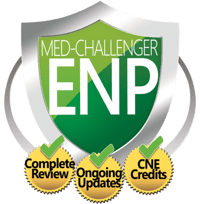
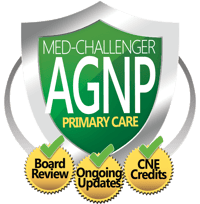
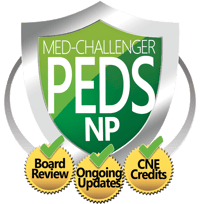
Is it nurse practitioner group or program education that you seek? Med-Challenger for Nurse Practitioner Training can help with that too!
What does it take to become a physician assistant? Med-Challenger can help.
What do family physicians say about Med-Challenger for ABFM board exam review and CME? We surveyed 3000 FM users. Here are the results.
It's Dermatitis Quiz Time with Med-Challenger! . 12‑yo with periauricular irritated skin , exam-style case for pediatric NP/PA and resident board...
Stay informed of new medical education content, certification requirements and deadlines, case-based CME quizzes, and special offers.